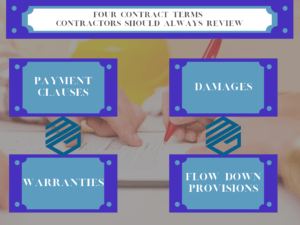David Porter is quoted saying, “Litigation is the basic legal right which guarantees every corporation its decade in court.” I find this very true in construction. Even in what appear to be “clear cut” circumstances, cases drag out for years and legal fees escalate. Although it will not eliminate litigation, it is much better to do a contract review up front, even if that means paying a good construction attorney. Bond underwriters are also very interested in the terms of your contract. After all, they are guaranteeing the performance of your contract. Here are some common construction provisions that every contractor should review and be familiar with and ready to discuss with their surety bond company. Surety bonds and bad contract terms does mix well and could cost a contractor money or even take them out of business.
Payment Clauses
Contingent payment clauses need an article of their own. You can read more about them here. It may not seem that way, but one word can drive a contractor out of business if things go poorly. There has been no shortage of contractors burned by “pay-if-paid” language in contracts. When “pay-if-paid” language is present, the contractor is taking on the payment default risk of the owner. If the owner does not pay the general contractor, the subcontractors are not entitled to payment either. Some states have made these provisions unenforceable saying they are against public policy. However, many states uphold them when written correctly. Contractors signing a “pay-if-paid” contract should always ask for evidence of owner financing. An even better practice would be to have this money funded and sitting in escrow although this is rarely agreed to. An alternative to “pay-if-paid” is “pay-when-paid”. This may not seem like a big difference, but it has been in the eyes of the courts. Courts have typically held that “pay-when-paid” is merely a timing mechanism. Payments will eventually have to be made regardless of if the owner pays the general contractor. As you can see, where a contractor and their bond company stand on these clauses will largely depend on where they are in the hierarchy. A general contractor will likely want to pass their risk of non-payment down to their subs and suppliers. The General Contractor’s surety is likely to support this decision and think this is a good practice. On the other hand, a subcontractor or supplier should very carefully weigh whether they want to take the payment risk when they have no direct relationship with the owner. Their surety bond company may even require that the language is changed before getting approval. The real key is to know what you are signing.
Damages
Another clause that could be detrimental to contractors are damage clauses. In general, most contractors should avoid contracts with “Consequential Damages” provisions. A more thorough explanation of consequential damages can be found here but let’s look at an example. Suppose you are building a medical facility and the project is behind schedule. A consequential damages clause could make you liable for lost revenue and profit to the facility. Those damages could easily add up to more than the construction contract. Instead, a best practice would be for contractors to insist on a mutual waiver of consequential damages. Examples of this can be found here. Instead opt for a liquidated damages provision. Liquidated damages provide a set amount, usually daily, for each day the contract is behind schedule. Although nobody wants to pay liquidated damages, they are fair to each party as there is a set penalty when the contract is signed. This will give your bond company comfort as they can assess their risk as well. A big mistake I see contractors make is having no damages provisions in their contracts. Remember, being silent on this could leave it up to interpretation and consequential damages may be assessed.
Warranties
No one knows what the future holds. The economy, labor market, interest rates and many other factors can significantly impact contractors. That is why contractors should pay attention to warranty requirements. Most bond companies are hesitant to write warranty or maintenance bonds of three years or longer. Almost nobody writes them longer than five years. We often see long term warranty requirements on roofs for roofing contractors, as well as for athletic fields and energy. In all cases, the long-term warranty should be passed back to the manufacturer. Otherwise, you may find bonding that project difficult.
Broad Flow Down Provisions
Flow down provisions are common in construction. They typically tie subcontractors and supplier to the same terms and responsibilities as the General Contractor and owner. This is not necessarily a bad thing. However, in such cases, subcontractors should request a copy of the contract before signing their subcontract. Remember, once you sign, you and your surety are committed. On the other hand, good general contractors should understand this and freely share their contract if they expect to bind other parties by it. Again, good risk management helps all parties know their commitments and expectations upfront to hopefully reduce costly litigation later.
Contractor’s and their sureties can not remove all risk. That is the nature of the business. They can look for ways to mitigate problems down the road and knowing your contract terms is a good start. Construction attorneys and contract review can be expensive but not nearly as expensive as dispute later. As Evelle Younger said, “An incompetent lawyer can delay a trial for months or years. A competent lawyer can delay one even longer.” As an added benefit, your surety will put more trust in your company and be able to stretch your bond capacity if they know you are protecting yourself.
Contact MG Surety today to speak with one of our surety bond experts.


